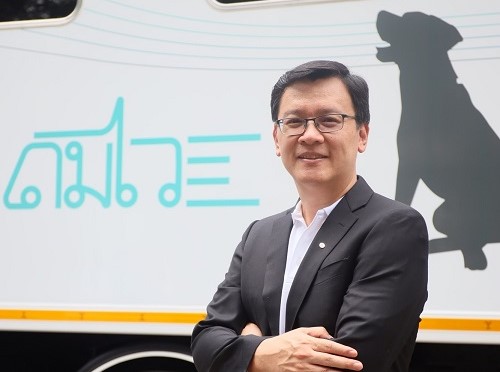press release Chevron and Chulalongkorn University’s “DOMVVI Vehicle” equipped with bio-detection dogs are gear up for the mission to screen COVID-19 cases in DDC’s communities.

With rising COVID numbers and a spike in hospitalizations nationwide, it became clear that building herd immunity to block the pathway for the ongoing transmission of the disease and a timely mass vaccination drive in affected communities are the key tools needed in curbing the ongoing crisis. With this goal in mind, the “K9 Dogs Sniff COVID-19” project is introducing the “DOMVVI Vehicle” to support active COVID-19 screening in selected areas under the jurisdiction of under the Department of Disease Control. This follows research findings that show these sniffer dogs can bio-detect and distinguish COVID-19 patients with more than 96% accuracy.

The said research is the ongoing collaboration between Chevron Thailand Exploration and Production Limited (Chevron Thailand), Faculty of Veterinary Science, Faculty of Medicine, and Faculty of Science of Chulalongkorn University, and PQA Associates Limited, in training six Labrador Retrievers in detecting asymptomatic COVID-19 patients from healthy individuals. The project was also a pioneer in the use of sniffer dogs for medical purposes in Thailand. The project which began in September 2020 found that these dogs can identify infected individuals from their perspiration with an accuracy of 96%, leading to the development of DOMVVI vehicle, spearheaded by Faculty of Engineering, to support the DDC’s proactive screening mission in various communities. Currently, the project in collaboration with Department of Disease Control is in the testing phase where sniffer dogs’ skills will put to be the test on the vehicle. The DOMVVI vehicle will be fully equipped with necessary equipment in alignment with the DDC’s requirements to ensure the health and safety of the bio-detection dogs and community members using the vehicle during the on-ground operation in the future.

Professor Kaywalee Chatdarong, Faculty of Veterinary Science researcher, Chulalongkorn University said, “There are three benefits of using bio-detection dogs: 1) quick-turnaround testing, 2) non-invasive approach, and 3) their ability to screen many people at once. Following satisfactory research findings in March 2021, we had earlier brought these bio-detection dogs to screen Chevron employees before their departure to offshore facilities and assist the Office of Disease Prevention and Control 12 Songkhla in screening the personnel as part of a real-life test. Later, as the outbreak worsened in Bangkok, sniffer dogs were brought to the screening center at the Faculty of Veterinary Medicine, Chulalongkorn University to screen Chulalongkorn personnel and more than 1,500 bed-ridden patients whose perspiration was collected by volunteers and the Ministry of Social Development and Human Security. The next stage of the project is proactive COVID-19 screening in community clusters, hence our collaboration with the Faculty of Engineering, Chulalongkorn University to design and develop a mobile laboratory, or DOMVVI vehicle, following successful precedents in the United Arab Emirates. Meanwhile, bio-detection dogs are being consistently trained to enhance their accuracy in distinguishing COVID-19 patients beyond the current rate of 96%.

Assistant Professor Juthamas Ratanavaraporn from the Faculty of Engineering and the designer of the “DOMVVI vehicle”, said, “The objective of DOMVVI vehicle is to support bio-detection dogs’ operation in proactive screening missions. The vehicle is designed to ensure the safety and efficiency of the operation for the staff, sniffer dogs and community members who use the service. Inside the vehicle, equipment for sample preparation and the screening operation have been installed, including the negative pressure unit in the sample preparation area, UV disinfection system in the sample transfer area, sample prep area and operation area, first aid kit and fire extinguishers in the vehicle. Additionally, a resting area has been designated for sniffer dogs when they are not working.”

Artit Krichphiphat, business support general manager, Chevron Thailand Exploration and Production, Ltd., said, “The ongoing COVID-19 pandemic has triggered widespread impact on the Thai society and economy. During the past year, with an approximate budget of 20 million baht, Chevron has provided much-needed medical supplies and funds to frontline health authorities as well as leverage innovation and expertise to empower government agencies to manage the crisis and support this breakthrough research. Chevron is pleased that the research has achieved this level of success, leading to the development of the DOMVVI vehicle and established a platform for bio-detection dogs to detect other diseases in the future. We hope to share this knowledge to other countries that are interested in training sniffer dogs to screen illnesses to contribute to the COVID-19 relief efforts in the long run.”